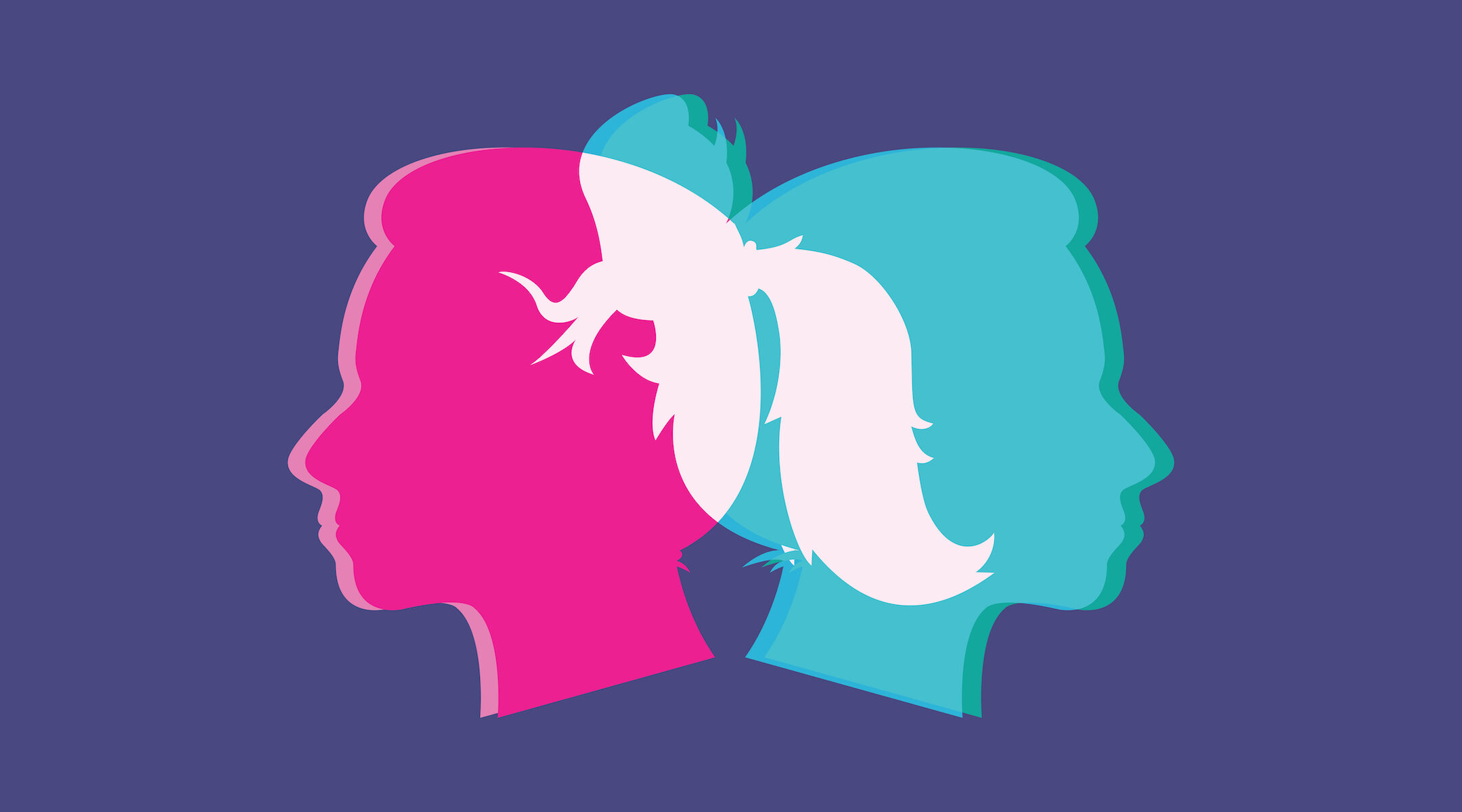(JTA) — My sister and I grew up in a small settlement surrounded by Arab villages in the disputed West Bank. We have ended up, however, in very different places.
I am currently pursuing a PhD in social psychology, studying the science of moral understanding and how it can be leveraged to bridge divides. My sister is an activist and full-time employee at an Israeli organization that strictly opposes personal relationships, especially romantic ones, between Jews and non-Jews.
My research focuses on bridging divides, but I am somewhat at a loss for how to traverse the widening gulf between my sister and me. She faces a similar dilemma — she is becoming increasingly (in)famous in Israel for her rhetoric against intermarriage while her own sister is … marrying someone who is not Jewish.
Conflict, of one form or another, has defined our entire lives. Our family moved from the United States to a settlement in the West Bank when I was five. We used to stop by Palestinian watermelon stands on our way back from Jerusalem. My brother became friends with the Arab workers who built our home.
At the turn of the millennium, everything changed and this sense of peaceful coexistence was gone. Riots broke out in Jerusalem, the West Bank and Gaza. My father bought bullet-proof vests for us to wear when we had to travel that same road to Jerusalem. The watermelon stands were gone. In their place, children threw rocks at cars that drove by. Two teenagers from our town went for a hike and never returned. Their bodies were found in a cave, mutilated beyond recognition. We grieved, then grew angry. I was keenly aware of the Jewish side of the conflict: We were the rightful occupants of the land; they were our enemy. We were righteous; they were evil.
As a child I was unschooled. My mother was your typical “hippie liberal all-natural health nut” when we lived in the United States. Over time, however, my mother, and the rest of my family, became less and less liberal.
At 15, I enrolled myself into a Jerusalem high school. The narratives in my classes conflicted with my political and religious upbringing. I began to understand there were two sides to the story. After high school, I worked at a store where my closest friend was Palestinian. We shared lunches and gossiped about our co-workers, and through our interactions I realized how prejudiced I had been.
Months later, in the military, I led an intelligence team, gathering data to inform the peace negotiations between Israel and the Palestinian Authority. Aspects of intelligence-gathering may be morally questionable, but it gave me the unique opportunity to come as close as possible to reading another person’s mind. We spent long hours learning everything about the “enemy” only to discover that they ate, slept, fought and loved just like we did. There was a wide gap between my family’s beliefs about the enemy’s thoughts and their actual thoughts.
My experiences growing up in the midst of an ongoing conflict fraught with violence and political volatility motivated me to work on bringing people together. Whether the conflict is between Israelis and Palestinians, Black and white people, or liberals and conservatives, I’m looking for ways to move beyond dehumanization and toward empathy and compassion.
My youngest sister, who was born a few months before the second intifada broke out and has known nothing but conflict her entire life, has chosen a different path. Rather than resolving to bring people together, she is working hard to keep them apart. She works for Lehava, which means “flame” in Hebrew, but in this case is also an acronym for the Hebrew phrase “For the Prevention of Assimilation in the Holy Land.” Lehava fights to prevent “relationships between Jewish girls and Arabs, non-Jews, and foreign workers.” Lehava has been described on several occasions as a far-right and Jewish supremacist group, and elected officials in Israel have embarked on the process of declaring it a terrorist organization.
Given my sister’s chosen career path, telling her that my non-Jewish partner had proposed was … difficult. She had previously told me (on national television) that she would be happy if he broke up with me, since then there would be a chance of me marrying a Jewish guy. Needless to say, she refuses to come to the wedding.
The only solution I have is to try and pull her in, rather than push her away. As painful as it is to hear her talk about how my actions are a threat to the Jewish nation, I know that hating her for saying hateful things will result in nothing but more hate. Instead, I’ve chosen to focus on loving her. I love her for being passionate about her values. I love her for stepping outside her comfort zone. I love her for reasons unrelated to her zealousness — she’s smart, funny, caring and beautiful, inside and out.
During my latest trip to Israel, my sister and I didn’t shy away from tough discussions. We talked about our conflicting values and beliefs. She expressed sadness about the sinful life she thinks I live; I expressed similar sorrow at hearing her talk about Palestinians. We agreed to disagree, then disagreed some more. But we also talked about other things. She took time off work to be my personal chauffeur for the week because I’d gotten too used to American roads and driving in Israel terrified me. I beat her at multiple games of Scrabble. We prepared meals together. I teased her about being too picky in her search for a husband, but also gave her some stern sisterly advice about not settling for someone she doesn’t like.
In his excellent book, “The War for Kindness: Building Empathy in a Fractured World,” Jamil Zaki tells the story of Tony, a Canadian ex-neo-Nazi. One of the pivotal moments in Tony’s transformation is when he confesses his deeds to his (Jewish) therapist Dov, who accepts him with open arms:
Here was this man who loved me and wanted to heal me, and here was I, a person who had once advocated for the annihilation of his people.
Tony felt he didn’t deserve a shred of compassion from Dov, but Dov extended it nonetheless. This cracked Tony open. He’d created a surface of hatred to cover his shame and loneliness. Once someone accepted him warts and all, he no longer needed it.
I don’t live in fantasyland. I don’t think my sister will drop her beliefs on intermarriage just because I love her and treat her kindly. But I do think that by responding with love, I might be able to prevent her extremism from getting worse. Perhaps by regularly exposing her to the fact that I’m in a relationship that makes me happier than I’ve ever been, she will soften her views, even just a little. Or at least, maybe she will continue talking to me rather than cutting me off entirely, as some family members do in such cases.
Though it is (arguably) easier to love someone if they’re related to you, this approach might be helpful in other contexts. Many people would rather shut down or at least disengage from discussion with people whom they view as intolerant, whether the intolerance comes from their religiosity, political ideology, or some other driving force. But they should consider how counterproductive this approach is. It does nothing to change the intolerant person, and may even motivate them to become even more intolerant. Instead, approaching them with kindness, accepting them, and, yes, even loving them, may have a more positive effect.
JTA has documented Jewish history in real-time for over a century. Keep our journalism strong by joining us in supporting independent, award-winning reporting.







